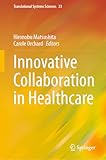Innovative collaboration in healthcare
Material type: TextSeries: Translational Systems Sciences; Vol. 33Publication details: Singapore Springer 2024Description: xvi, 264 pISBN:
TextSeries: Translational Systems Sciences; Vol. 33Publication details: Singapore Springer 2024Description: xvi, 264 pISBN: - 9789819945658
- 362.1068 MAS
| Item type | Current library | Collection | Call number | Copy number | Status | Date due | Barcode | |
|---|---|---|---|---|---|---|---|---|
 Book
Book
|
Indian Institute of Management LRC General Stacks | Public Policy & General Management | 362.1068 MAS (Browse shelf(Opens below)) | 1 | Available | 008985 |
This book is the first to approach collaboration in healthcare from a translational systems science perspective. There is a complex intertwining of collaborative relationships between diverse sectors, industries, universities, professions, teams, patients, and machines and robots powered by artificial intelligence and big data. Innovative collaboration is evolving both in the real world and in the virtual space of the Internet. While respecting patient-centeredness, collaboration is required in various settings and under different contexts such as hospitals, communities, use of new technology development, integrating industry academia-hospital-government relationships, through interprofessional approaches. However, it is only recently that “collaboration” in health professions has begun to be researched and discussed scientifically.
The purpose of this book is to review and recapture “innovative collaboration” in modern healthcare, primarily from the perspective of translational systems science. To attain our goal, the authors have prepared three unique perspectives. The first is interprofessional collaboration. The elegance, sturdiness, and resilience of the tapestry depend heavily on cooperation between professions and the multisector. The second angle is patient-centeredness. In recent years, “patient-centeredness” has become an established motto, but to what extent is patient-centeredness, including ethics, realized in collaboration? We would like to introduce advanced approach. The third perspective is man-machine collaboration. Collaboration with robots and sensor systems connected to artificial intelligence and big data is becoming more common in all aspects of healthcare. While introducing advanced cases, the authors would like to critically analyze the ethics and conflicts that tend to hide behind the scenes.
(https://link.springer.com/book/10.1007/978-981-99-4566-5)
There are no comments on this title.

